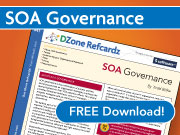 SOA Governance and Decision Rights
SOA Governance and Decision Rights
At the SOA Consortium meeting, Fill Bowen of IBM asked me a question after my soapbox on SOA Governance that I thought would make a great post. He was surprised that I didn’t mention the words “decision rights” a single time in my post. It’s a great question, especially because the IT Governance book from Jeanne Ross and Peter Weill of MIT’s CISR defines IT governance as “specifying the decision rights and accountability framework to encourage desirable behavior in the use of IT.”
In all of my posts on SOA Governance, and in my SOA Governance book, I don’t think I’ve talked about decision rights once. While this was certainly unintentional at first, I’ve now given it some thought and I’m happy that I didn’t include it or emphasize this viewpoint. The closest I’ve come is in my discussions around the people component, and stating that the people do need to be a recognized authority. Obviously, recognized authority does imply some amount of decision rights. At the same time, I think that’s emphasizing the wrong thing. There is a negative view around the term governance because people associate it with authorities flaunting their power. The emphasis needs to be moved away from the people, and instead focus on the policies. As I stated in my “Governance does not imply Command and Control” post, if you focus on education, you can allow individual teams to make decisions, because you’ve given them the necessary information to make the right decisions. If they don’t have the information to make decisions that will lead toward the desired behavior, it turns into a guessing game. Not only can there be confusion in what the correct decisions are, there can also be confusion on what decisions should be escalated up the chain. If we instead focus on creating policies and making those policies known so that anyone in the organization can make the right decision, we’re in a much better state. Yes, you will run into some situations with conflicting policies, or the absence of a policy, but if those are the exception, it should be far easier to know that those decisions require escalation or inclusion of others.

[…] Biske, whom I respect for his writings on SOA, seemed to miss the mark in his recent blog post about SOA Governance and Decision Rights. In that post, he […]
[…] Malik posted this response to my previous post on governance and decision rights. In it, Nick claims that what I posted was a workable set of […]
[…] SOA Governance and Decision Rights […]
[…] and that’s perfectly all right. If your view of governance is that it’s all about decision rights, this is in line with that approach. The policies don’t end there, however. The next policy […]